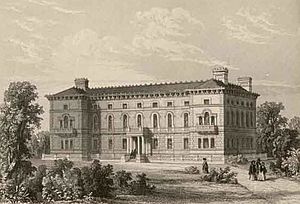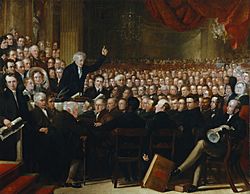Joseph Soul facts for kids
Joseph Soul (1805–1881) was a British reformer who lived in the 1800s. For 36 years, he worked hard to help orphaned children in London. He also strongly supported ending slavery. Soul worked at the Orphan Working School in Hampstead. Later, he helped start another orphanage in Holloway. These two schools eventually became the Royal Alexandra and Albert School.
Contents
Joseph Soul's Life and Work
Early Life and Helping Orphans
Joseph Soul was born on November 14, 1805. He was baptised in a church in Shoreditch in February 1806. His parents were Eli and Elizabeth Soul.
He became the secretary for the Orphan Working School in Hampstead. This school had been helping children since 1758.
Fighting Against Slavery
In 1840, Joseph Soul went to the World's Anti-Slavery Convention in London. This was a big meeting about ending slavery. His picture was included in a famous painting of the event. This painting is now in the National Portrait Gallery in London.
For several years, Soul wrote letters to Thomas Clarkson. Clarkson was an older leader in the fight against slavery. Soul kept him updated on the progress of efforts to completely abolish, or end, slavery.
Growing the Orphan Working School
By 1859, the Orphan Working School was home to 250 children. Since it began, the school had cared for 1,889 children. The school relied on money donated by the public. It hoped to grow and take in even more children.
The children learned about the History and Geography of the Bible. They also studied religious texts. Two of the orphans at the school had been saved by a brave woman named Alice Ayres. Alice had died while saving these children. She was buried with public sadness because of her heroism. The school taught these children skills so they could become domestic servants.
Starting a New Orphanage
In 1864, plans were made for another orphanage. This second school was for children aged five to eight. The Orphan Working School founded it, and Joseph Soul was its first honorary secretary. The new school was located at Albert Hill in Holloway, London. It welcomed children from all religious backgrounds.
In 1867, Queen Victoria visited the new school. She planted a Wellingtonia Gigantea tree during an "Inauguration Ceremony." This marked the official opening of the school.
Education and Daily Life
By 1870, the "Orphan Working School" taught History, Geography, English, and Maths. The Maths lessons for boys were described as "excellent." The girls' school was not quite as good, but still helpful.
The school was very busy. In one year, the children and staff made over 1,000 items of clothing. They also repaired 17,000 other items. This included making 130 frocks, trimming 130 bonnets, and repairing over 18,000 stockings.
A Home by the Sea
In 1875, Joseph Soul helped create a special home in Margate. This was a place where children from the Hampstead school could go to get better when they were sick. It was called a convalescent home.
Princess Mary and the Duke of Teck officially opened this home. A leading politician, Earl Granville, sadly noted that the children often faced health challenges.
Joseph Soul's Legacy
Joseph Soul passed away in 1881. The schools he helped establish continued to grow. They eventually became known as The Royal Alexandra and Albert School, which still helps children today.
 | Mary Eliza Mahoney |
 | Susie King Taylor |
 | Ida Gray |
 | Eliza Ann Grier |



